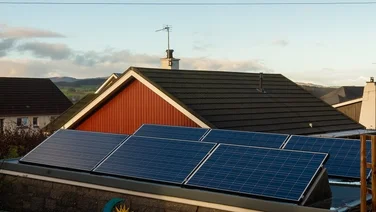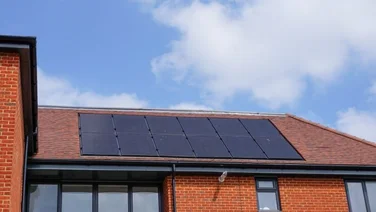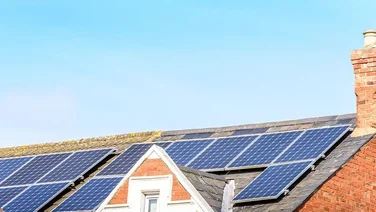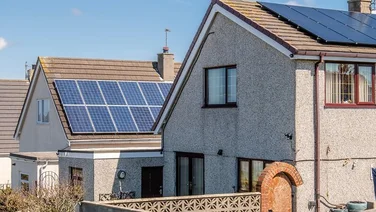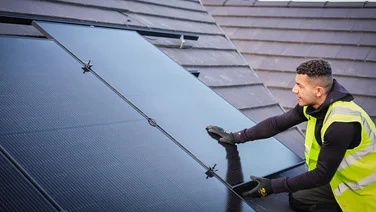- How do caravan solar panels work?
- How much do caravan solar panels cost?
- How much electricity can caravan solar panels generate?
- Can you go fully off-grid with caravan solar panels?
- Do you need a solar battery for your caravan?
- How long do caravan solar panels take to install?
- How many solar panels do you need for your caravan?
- Regulators and charge controllers
- Top tips for looking after your caravan solar panels
- Summary
- FAQs
- The largest widely available solar panel system for a caravan is 250 watts (W)
- A leisure battery, typically 12 volts, is enough to power basic appliances
- Caravan solar panels start from £70 and go up to £1,000

Caravans represent freedom for many people, with the ability to up sticks and live off grid as one of their most appealing features – and with the cost of solar panels falling, this sunlight-absorbing technology can help.
After all, the main downside to caravans is that many of them still rely on fossil fuels to function, meaning they’re not reliable enough to truly go off grid.
Thankfully, you can get around this by sticking a few solar panels on your caravan’s roof.
With solar panels on your caravans, you won’t need to worry about running out of power. So if you’re ready to start looking for solar panels, why not fill in our simple form? Just pop in a few details and our trusted suppliers will get back to you with quotes.
Where do you want to install solar panels?
Get startedHow do caravan solar panels work?
Solar panels for caravans are typically the same kind that you would use on a house roof, only they tend to be smaller.
Sometimes, flexible solar panels are used for caravans. These bendy solar panels are lightweight, and can easily bend to fit the shape of a caravan. The downside is that they tend to have a lower output than traditional solar panels.
To install solar panels on a caravan, they first need to be attached to the caravan roof. This can be done either by drilling metal mounts into the roof, or by using plastic mounts with an adhesive material, such as glue.
Then the solar panels are connected via wires to an inverter and charge controller, which are connected to the caravan’s leisure battery.
The inverter converts the direct current (DC) electricity the panels generate to alternating current (AC) electricity, the kind appliances use. The charge controller regulates the flow of electricity.
The leisure battery is a battery within the caravan that can power all the amenities you’d need.
Attaching solar panels to a caravan would allow you to power the leisure battery, without the need to turn on the engine, from a TV to the lights, through to more demanding appliances such as a fridge or a kettle, leisure batteries are essential.
How much do caravan solar panels cost?
Caravan solar panels start from £70 for a small 30 W system, and go up to £1,000 for panels with 250 W or more.
Prices for portable solar batteries start at around £270, up to over £4,000 for high capacity units.
How much electricity can caravan solar panels generate?
The largest widely available solar panel system for a caravan is 250 watts (W), so we’ll use it as a benchmark.
Assuming your caravan is exposed to six hours of direct sunlight in a day, we can multiply 250 W by six to get 1,500 watt hours (Wh), or 1.5 kilowatt hours (kWh) of electricity.
You should consider accounting for the weather, since heavy clouds can reduce solar panel efficiency by as much as 67%.
Can you go fully off-grid with caravan solar panels?
Your ability to go fully off grid in your caravan depends on your solar setup. If you’ve got a small system, say one with a 30 W output, you would struggle to go fully off grid.
This is because a system of this size would only work to top up your caravan’s leisure battery for limited use at night.
To go fully off grid, you would need a solar panel system capable of generating enough power for your needs even when there isn’t much sun.
If you want to find out more about small, portable solar panels you can use for hikes, or camping, go to our guide. You might want also want to check out foldable solar panels for on-the-go green energy.
For eco-friendly cooking devices, see our page on solar ovens.
Where do you want to install solar panels?
Get startedDo you need a solar battery for your caravan?
Most people use solar panels to fully power their caravan during the day, and charge the leisure battery for use at night.
A leisure battery, typically 12 volts, is enough to power basic appliances such as kettles, televisions, or even a fridge for hours at a time.
If you plan to have a complete off-grid setup, you will need a larger battery, especially if you plan to use more power-consuming appliances.
Portable solar batteries exist and typically range in power capacity from 210 Wh to 3.5 kWh.

How long do caravan solar panels take to install?
Installing solar panels on your caravan will take 1–2 days, depending on the size of the system.
You can install solar panels on your caravan by yourself, with many DIY kits sold online.
It is always better to use a trusted installer however, because of the potential risks.
Installing solar panels correctly can be complicated — installing it incorrectly could result in either not enough power being generated, or none at all.
Worst still, you might end up damaging your battery, which can lead to a fire or even an explosion.
How many solar panels do you need for your caravan?
Appliance | Energy needed each day in watt hours | Number of 100 W solar panels needed to power appliance |
|---|---|---|
Living room light | 48 | 1 |
Halogen light | 20 | 1 |
Kitchen fan | 10 | 1 |
Kettle | 200 | 2-3 |
Water pump | 8 | 1 |
14-inch 12-volt TV | 90 | 1-2 |
It’s very important to make sure you get enough solar panels to meet your daily needs — too few and you’ll run out of energy to power your appliances. Too many and you’ll feel like you’ve wasted money.
Below are three helpful steps you can take to work out how many solar panels you might need for your caravan.
1. Make a list of your appliances’ wattages
To find out how many solar panels you’ll need for your caravan, you first need to work out how much electricity you use.
Start with working out the wattage of the appliances you use in your caravan. You’ll typically find this on the bottom of the appliance, but if not you should be able to find it out online.
Here’s a few appliances commonly found in caravans and their typical wattage:
2. Work out your daily appliance usage
Next, work out how long you use each appliance for each day. For example, if you use an 8-watt light bulb for 3 hours a day, you will need 8 watts x 3 hours = 24-watt hours per day for that light.
Do this for every electrical item, then add all the results together to find out how many watt-hours, in total, you’ll need your solar panels to generate.
In the example below, you would need to work out what size solar panels would give you 224-watt hours of electricity each day.
All solar panels’ power ratings are measured in watts, but it’s important to remember that they won’t produce this much power all the time.
Instead, the rating is the maximum amount of power the solar panel can produce in optimal conditions — that is, when the sun is at its brightest.
3. Work out how much power you’ll need through the seasons
Summer will bring between four and seven hours of bright sunshine per day. To produce 224 W over four hours, you’ll need a 56 W solar panel (224 ÷ 4). The winter is different — you can expect around one hour of peak performance from your panels.
So you would need a panel capable of outputting at least 224 W to keep your caravan’s lights and appliances running in winter. Spring and autumn sunshine hours fall somewhere in the middle.
Here’s the amount of power you can expect from various sizes of a panel on an average summer and winter day:
The ratings above aren’t a guarantee of how much power you’ll generate — think of them as a guideline for what to expect. You can assume a 50 W panel is going to produce twice as much power as a 25 W panel, for example.
Our advice is to add an extra 20% of power onto what you think you’ll need. That way, you can compensate for cloudy days and shade. Considering the above, we suggest:
- Getting an 80 W panel if you plan to only use your caravan in the summer.
- Getting a 250 W panel if you plan to use your caravan all year round.
If you only want to keep the battery charged when you’re not using the caravan, a 20–30 w solar panel will be enough.
Regulators and charge controllers
Unless you’re installing a tiny solar panel, you should get a regulator or charge controller. This stops your battery from being overcharged, which damages it, and also regulates its temperature to stop it from overheating.
Check the regulator includes a blocking diode, which prevents power from going back into the solar panels from the battery when it’s dark. If your panel is so small that you’re not using a regulator, you’ll need a blocking diode anyway.
Prices for regulators start at £15 and go up to £70. Get a good quality regulator; it will help you get the best out of your system. You may also need an inverter, which converts the battery current (DC) to mains electricity (AC).
A regulator is essential if you’re installing solar panels over five watts. This is because solar panels can overcharge your battery, which can cause damage to the battery or worse, a fire and/or explosion.
Solar panels under five watts don’t need a regulator, because the power output is low enough that they won’t cause damage to the battery.
Top tips for looking after your caravan solar panels
Solar panels are well known for requiring little maintenance, but that doesn’t mean you can just leave them alone indefinitely. Here are a few top tips to get the best out of your solar panels:
- Use more efficient appliances By using more efficient appliances, you will use less electricity. This means the energy generated by your solar panels will go further, which can be essential for off-grid living. For example, opting to use LED light bulbs instead of halogen bulbs is a good way to get more from your solar panels.
- Make good use of your regulator If you can see how fast the battery is discharging, you can identify which of your appliances use the most power, and turn them off when you don’t need them or when the battery charge starts to get low.
Summary
Solar panels for caravans are a no-brainer if you can afford them. They let you drastically reduce fuel usage, help you reduce your emissions, and with a large enough system, allow you to live off grid for longer or even indefinitely.
Ready to get solar panels for your caravan? Get the ball rolling by filling in our simple form. Our trusted suppliers will get back to you with bespoke installation quotes.
FAQs
What solar panels are best for caravans?
The best type of solar panels for caravans are highly efficient monocrystalline panels. Monocrystalline solar panels are more efficient on average than polycrystalline or thin-film solar panels, and can reach up to 24% efficiency (the average is 20%).
If you choose a highly efficient panel, you’ll be able to produce more electricity with fewer panels, or with smaller panels. This is ideal for caravans, which typically have limited roof space.
Is a 200 W solar panel enough for a caravan?
A 200 W solar panel should generate enough electricity to power the average caravan all year round.
In fact, it’s likely to produce more electricity than the caravan will need in the summer, when the days are longer, and there’s less cloudy weather. In the winter, it should produce just the right amount.
How long does a caravan battery last?
Caravan batteries typically last five years. However, the battery’s lifespan can be reduced slightly with improper care, such as if it’s left without charge for long periods of time.



